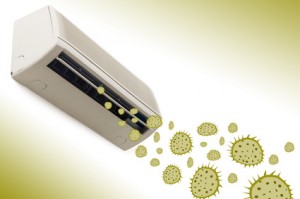How Mold Can Get into Your AC Unit
 Atlanta, Georgia – One thing homeowners worry about if there is a leak in their homes is an outbreak of mold. One area they might not think to keep an eye on is their air conditioning unit. Mold can develop and accumulate in a home’s air conditioning unit, and then circulate the spores throughout the home as it distributes cool air.
Atlanta, Georgia – One thing homeowners worry about if there is a leak in their homes is an outbreak of mold. One area they might not think to keep an eye on is their air conditioning unit. Mold can develop and accumulate in a home’s air conditioning unit, and then circulate the spores throughout the home as it distributes cool air.
Mold is a part of everyday life. But when it develops in an AC unit, homeowners should take notice and call their repair technician to help clean the unit. But how can homeowners know that their unit might be growing mold?
“The first step might be to use your nose, “says Phil Montgomery, an Atlanta cooling service expert and owner of Atlanta Heating and Air Conditioning. “A home may develop a musty smell if mold is growing in an AC system. As soon as a homeowner notices a smell, they should call their air conditioning and heating repair company to inspect their unit.”
The moist and dark areas inside an AC unit are a prime location for mold to accumulate. Mold typically will grow when an outside unit or window unit has its cover left off or during the winter months when it isn’t in use. Water condenses on the AC coils, and then if dust or dirt happens to be on the coils, mold will grow. Other ways mold can accumulate include using filters that allow dust to pass through, a unit that is too big for the home and having an air intake located in a moldy basement or other space. Mold can also accumulate in the ductwork if moisture is allowed to seep into the ductwork of a home. And if any debris is located there, which can especially be a problem in newer homes where dust can be left over from construction, mold will grow.
But homeowners don’t need to worry – there are some things they can do to clean the mold themselves before their unit is too clogged to work efficiently.
Homeowners should begin by changing their filter. Filters should work to keep dust and other debris out of an AC unit. However, if a homeowner doesn’t use a filter that is rated high enough, small debris can still get through. That dust can then settle onto the unit’s coils and grow mold.
The best way to stop mold growth is to locate where the outbreak happened. Are there leaks in the HVAC unit? Is your outside unit particularly dirty? Is your filter not trapping enough dust and debris? Frequent cleaning and changing of filters is essential to keep a home protected from mold.
In homes with window unit air conditioners, homeowners may be able to clean the unit of mold themselves. They should first turn the unit completely off, and then use a strong cleaning solution to clean the mold from the unit. Homeowners should be sure to wear a mask to prevent them from breathing in mold spores or other harmful airborne particles.
“Any place with moisture can be a breeding ground for mold,” says Montgomery, who has provided Atlanta air conditioning repair services for more than 40 years. “Homeowners should monitor their HVAC units for leaks, and areas within the unit where moisture can accumulate. This is especially important in climates where humidity tends to be higher.”
Central AC units, as well as window units, can also be cleaned with mold removal cleaners. Homeowners should take extra care to be sure water does not get in to the electrical components of the unit, and should avoid using the unit for several hours after cleaning it. The unit should be given a chance to dry completely to prevent further mold growth.
According to Atlanta AC repair expert, having mold in an AC unit can negatively impact the health of a home’s residents. Mold, such as black mold or toxic mold, can have very serious side effects such as skin irritation, headaches and other issues that can accumulate over time. Mold may not be visible to homeowners, so if members of your family are experiencing health problems that are unexplainable, consider having your AC unit inspected for mold.
If you suspect you have mold growing in your unit, call your local HVAC company, such as Atlanta Heating and Air Conditioning, to perform an inspection today before your unit, or your health, suffers.




